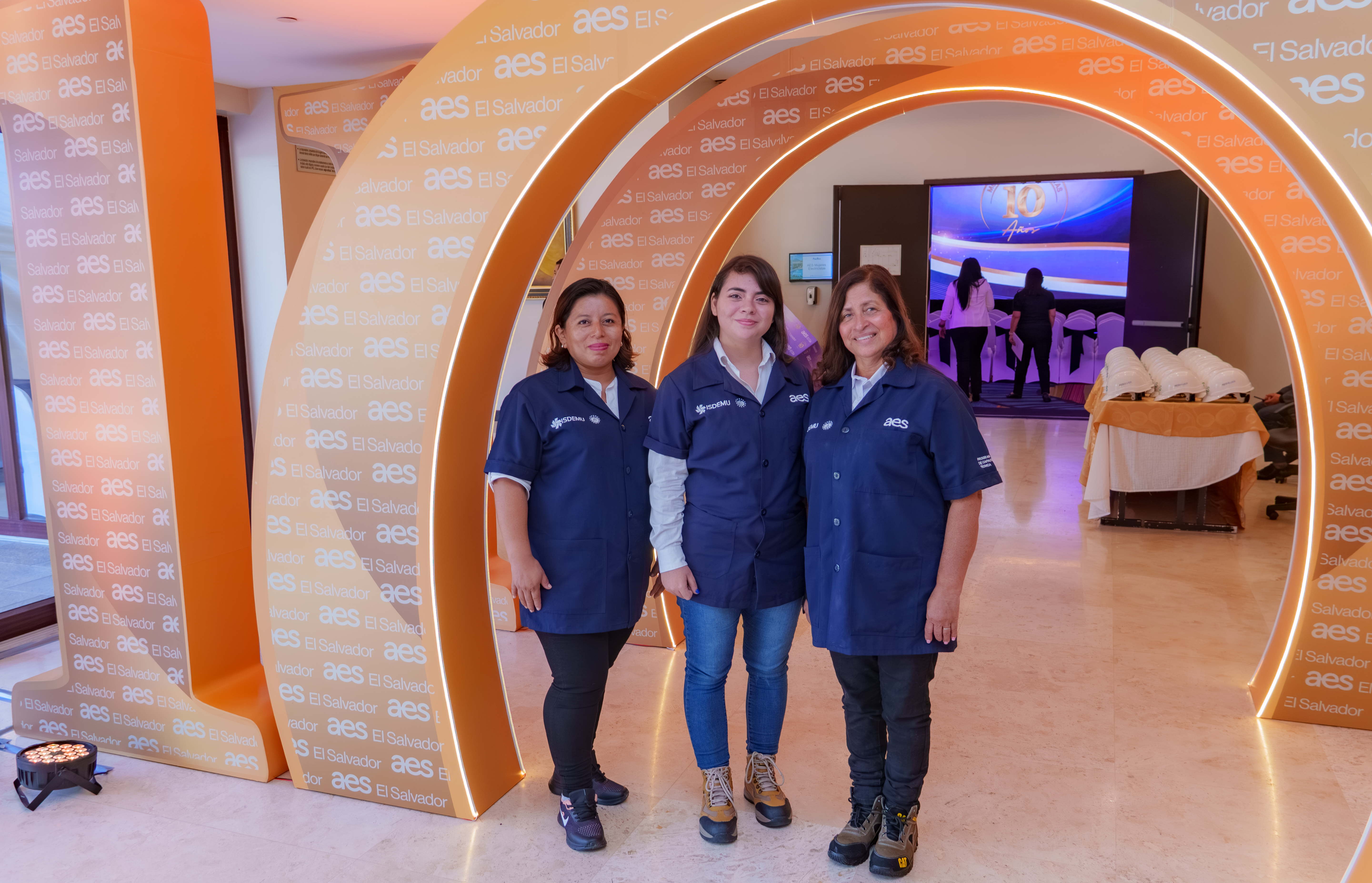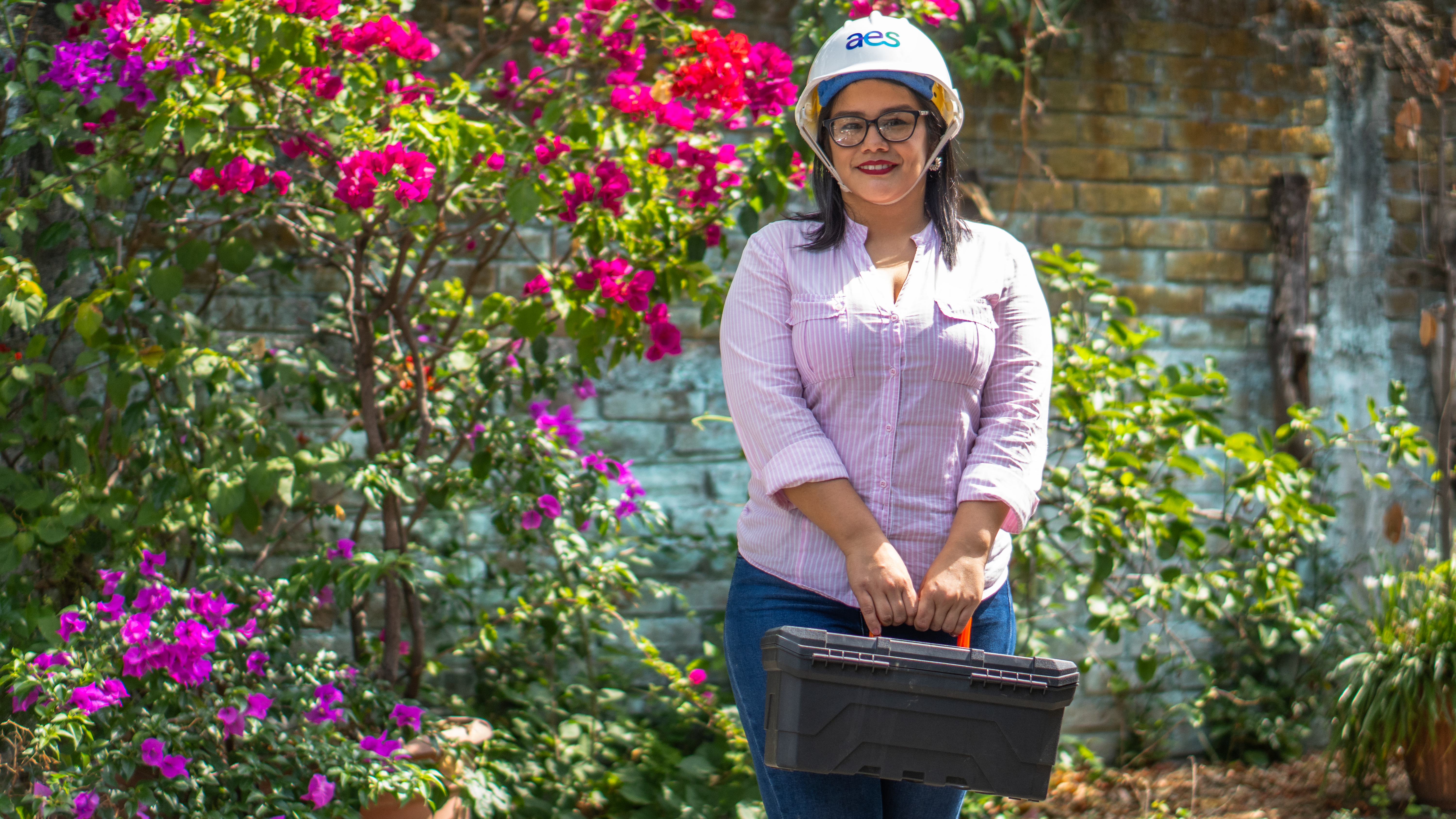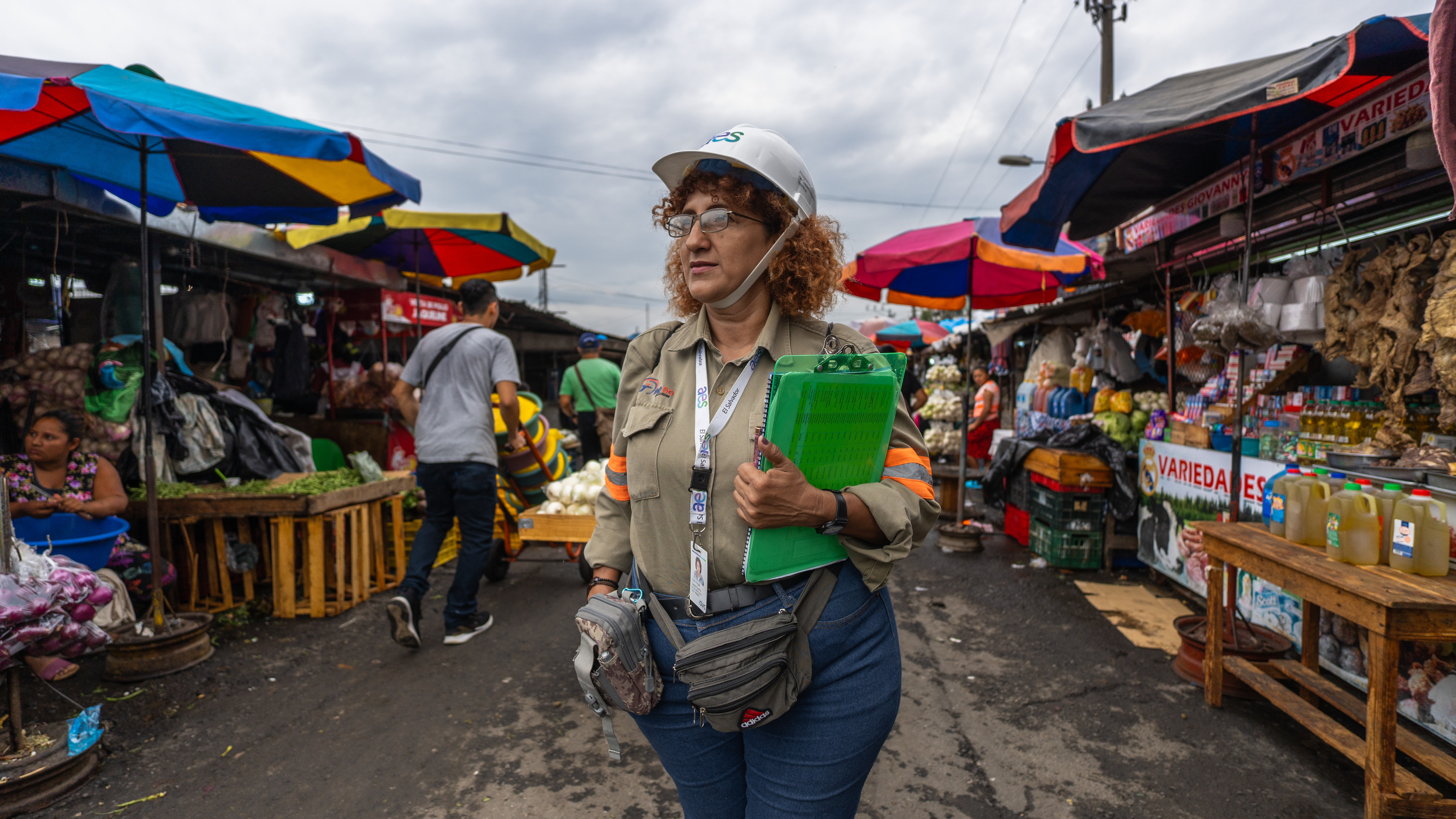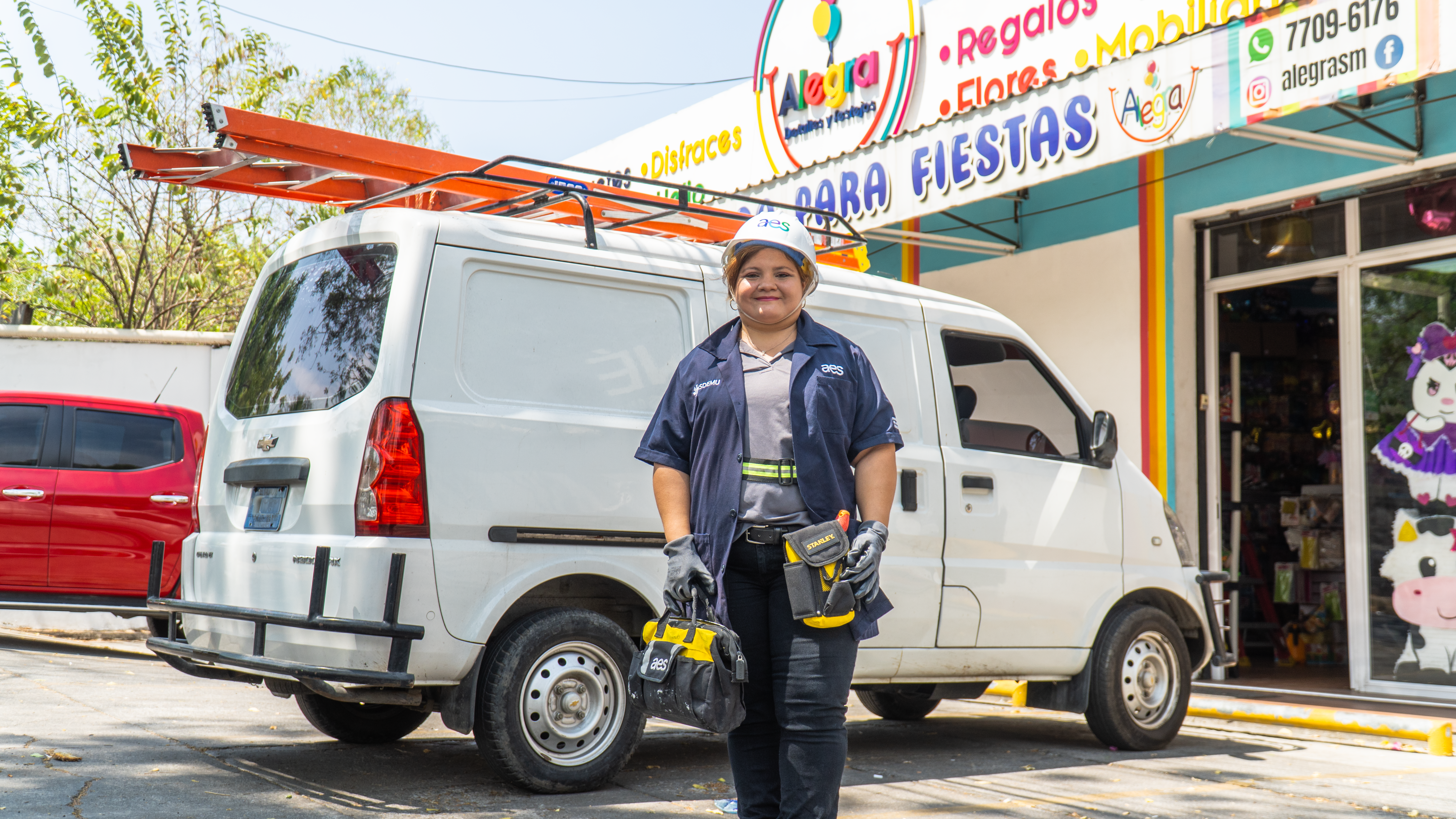Article – Vida & Éxito – Electrician Women Special
Women Electrician: Ten years and over a thousand stories to transform the salvadoran electric sector
October 9, 2025

In El Salvador, more than half of the population are women, but less than half participate in the formal labor market, according to the latest Census of Population and Housing data. This reality is even more evident in technical trades, where the female presence has been minimal.
Facing this challenge a decade ago, AES El Salvador created the Electrician Women Program, with the purpose of opening opportunities in a sector historically dominated by men. Ten years later, the initiative has consolidated itself as a regional benchmark for inclusion and social development.
A Decade of Achievements and Great Alliances
Since 2016, the program has trained 1,049 women in 54 specialized courses, of which 1,006 have obtained official certification as Fourth and Third Category Electrician Technicians. According to the General Superintendency of Electricity and Telecommunications (SIGET), this figure represents more than half of the total women certified in the country within these categories, making the program one of the main drivers of female training within the Salvadoran electric sector.
Its success is largely explained by the joint work with strategic allies: the Salvadoran Institute for the Development of Women (ISDEMU), which supports participants with key psychosocial assistance for their permanence and confidence in the process; the Specialized School of Engineering ITCA-FEPADE, which ensures rigorous and high-quality technical training, preparing women to meet the demands of an increasingly competitive market; and the General Superintendency of Electricity and Telecommunications (SIGET), which officially accredits the women's acquired competencies and validates their incorporation into the labor sector as certified professionals.
This network of strategic allies guarantees that AES can reach a greater number of women to receive comprehensive technical training, ensuring high standards of quality in the teaching. Furthermore, thanks to this model, each participant obtains the institutional support that allows her to make her way in a constantly evolving electric sector.
In this sense, in addition to promoting women's learning about residential electrical installations, the program has incorporated other areas of technical study such as meter reading, motor automation, photovoltaic systems, and air conditioning systems, which expands their opportunities for entry into high-technical-value industries.

National and International Recognition
AES El Salvador's commitment to the technical development of women is reflected in the more than US$625,000 invested over the last decade. Thanks to this commitment, the Electrician Women Program has consolidated a solid model that has crossed borders and been replicated by the AES Corporation in countries such as Panama, Colombia, Chile, and Mexico. Furthermore, in September 2025, it was recognized as a finalist in the Platts Global Energy Awards, one of the most important awards in the energy industry worldwide.
For AES, this recognition elevates the pride of the participants and of everyone who has been part of this collective effort.
Accelerating the Future of Energy with Inclusion
Consolidated as a benchmark for inclusion in the sector, AES El Salvador maintains the commitment to expand the program's scope and open more spaces for hundreds of women to find new professional training opportunities. Likewise, the impact of these ten years demonstrates that, with solid alliances, sustained investment, and a social vision, it is possible to transform historical barriers into windows of opportunity. Thus, the female presence is growing and contributing increasingly to the country's technical, economic, and social development, marking a before and after in the history of the Salvadoran electric sector.
Stories That Illuminate: Ten Years, Hundreds of Lives Transformed
The tenth anniversary of the Electrician Women Program finds its greatest expression in the lives of those who have been part of it. These stories show how technical training has opened doors, provided independence, and transformed realities in different parts of the country.
Tamara Chamorro: From Apprentice to Entrepreneur

In 2019, Tamara Chamorro faced personal and economic difficulties that seemed to limit her future. That's when she decided to enroll in AES El Salvador's Residential Electrical Installation Courses. “The AES opportunity changed my life,” she asserts.
After being certified as an electrician, she participated in a seed capital competition that allowed her to found Electra Services, a company dedicated to the maintenance, construction, and repair of residential electrical systems. With that initial investment, she was able to acquire tools, specialized equipment, and a work vehicle.
The beginnings were not easy. “Sometimes I would arrive at places where there were ten men and I was the only woman. It was difficult, but little by little I managed to earn respect for my work,” she recalls. Today, her company generates employment for other women, expanding the impact of her experience. “I know what it’s like to start from the bottom, without support. That’s why now I want to help other women empower themselves, to believe in themselves,” she states with conviction.
Cesia Gálvez: A Second Chance for a New Path

With a helmet, boots, and determination, Cesia Gálvez is proof that it’s never too late to start a new path. At over 50 years old, she found an opportunity to reinvent herself in the program. “Learning electricity was like turning on a light inside me. I told myself: ‘If men can do it, so can I,’” she recounts.
Today, she works on load censuses for the company QVC, a contractor of the AES El Salvador distributor, AES CAESS. Her outgoing nature and technical training have made her a role model in her community. “Today I feel useful, independent. I no longer wait for someone to give me work, I go out and look for it with my tools in hand,” she affirms.
She often hears phrases like: “You’re the first woman electrician I’ve seen around here!” Her answer is always the same: “I won’t be the last.” That conviction summarizes the role she plays as a reference for resilience and cultural change.
Karina Fernández: Business Leadership in the East

In 2020, Karina Fernández decided to break stigmas and enroll in the fourth-category electrician course. What began as a technical training process became the starting point for Aire Global Climatizado, a company that offers electricity and air conditioning services in San Miguel.
Five years later, Karina leads a team in which men and women collaborate on equal terms. “It’s not about being a woman or being a man. It’s about doing it well, with responsibility and passion,” she maintains.
Her company has managed to position itself in the eastern part of the country as a benchmark for quality and commitment, demonstrating that female entrepreneurship has a solid space in technical sectors. “Starting a business hasn't been easy, but it has been worth it. If I succeeded, many others can too,” she assures.
Jocelyne Iglesias: Energy to Get Ahead
In 2023, Jocelyne Iglesias decided to transform her life for the well-being of her son David. That same year, she was certified as a fourth-category electrician and founded J&D Servicios Eléctricos in Cojutepeque.
The beginning was not simple. “At first, some clients doubted my abilities just because I was a woman, but with every job completed, I demonstrated that my knowledge and quality of service have nothing to do with my gender,” she explains.
Today, her business is a symbol of personal achievement and a beacon of hope for other women who dream of making their way in the electric sector.
Krisia Fuentes: Eyes on the Heights
Graduated as a fourth-category technician, Krisia Fuentes dreams of becoming a linewoman and working on electrical networks. “Being up there is like proving that nothing is impossible. It fills me with courage, it makes me feel powerful,” she affirms.
While reaching that goal, she performs residential installations that allow her to support her family. “Everything I have today is thanks to that knowledge. Now I can support my family doing what I love,” she explains.
Her story inspires her children and other women. “I want other women to know that yes, they can do it. That there are no limits when you set out to change your life,” she concludes.
The trajectories of these women reflect the reach of the Electrician Women Program in opening spaces, transforming lives, and demonstrating that female talent has a key role in building a more inclusive energy present and future for El Salvador.
In each generation of electrician women, an evolution in the social perception of women's role in the technical field is observed. The success stories multiply, and each individual advance contributes to breaking down barriers and building role models for new generations. Thanks to these achievements, women's access to better job opportunities has increased, and their presence in the electrical field is now a symbol of innovation and progress for Salvadoran society.